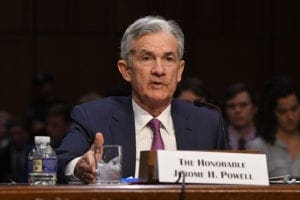The 4th of July saw less unity for America than Federal Reserve Chairman Jerome Powell’s testimony to Congress this week. Both the Dow and S&P 500 hit record highs as cuts on interest rates were all but guaranteed. However, some surprising critics have come forward.
As the Trump administration walks back notions of replacing Chairman Powell, the top US central banker appeased both Republicans and Democrats on the House and Senate financial services committees.

At a time of great political and cultural divisions in the country, the establishment consensus is that the strong Trump economy needs even looser monetary policies.
“While overall financial conditions remained supportive of growth, those conditions appeared to be premised importantly on expectations that the Federal Reserve would ease policy in the near term,” Powell told the House committee on Wednesday.
It’s become a classic trait of Fed chairmen and women to speak in ways that so that any listener hears just what they want to hear. This writer interprets that statement as an admission of a bubble economy dependent on lower interest rates.
On Thursday, Powell reiterated his main points to the Senate, urging another increase in the debt ceiling. He also spoke on Bitcoin, comparing it to gold.
“Almost no one uses Bitcoin for payments. They use it more as an alternative to gold, really. It’s a store of value. It’s a speculative store of value like gold,” Powell said.
While some Bitcoin enthusiasts were excited at the comments, Austrian school libertarian stock broker Peter Schiff saw it merely as further encouragement of bubble speculation.
“Ignorance of money is part of his job criteria!” Schiff tweeted.
In the financial world, it’s hard to find a more relentless critic of the Fed than Schiff. But a surprise opponent popped up Wednesday in David Kelly, chief global strategist at J.P. Morgan Asset Management.
Kelly told CNBC that Powell is “fundamentally making a mistake” by lowering interest rates, a move widely expected to come at the end of July.
“I think they’re worried about independence. I think they’re worried about getting too criticized by the administration,” Kelly said.
The JP Morgan strategist also expressed disturbance at the Fed’s “obsession” with hitting a 2 percent inflation rate. In this instance, the Fed measures inflation as an increase in consumer good prices.
“That’s a slippery slope,” Kelly said. “We may not get to 2 percent inflation. Does that justify October? Does that justify December? You could go all the way down to zero on the Federal Funds Rate and not get to 2 percent inflation.”
The great journalist and economist Henry Hazlitt labored to teach the straight definition of inflation to the masses. He wrote in Inflation For Beginners:
“The word ‘inflation’ originally applied solely to the quantity of money. It meant that the volume of money was inflated, blown up, overextended. It is not mere pedantry to insist that the word should be used only in its original meaning. To use it to mean ‘a rise in prices’ is to deflect attention away from the real cause of inflation and the real cure for it.”
The future of the economy depends on the masses. Will enough of the populace be skeptical that the whole Congress comes together to praise the Federal Reserve’s policies, as stock markets hit all-time highs? The bubble is going to burst, so the question is how Americans will prepare for it and react when it does.




















